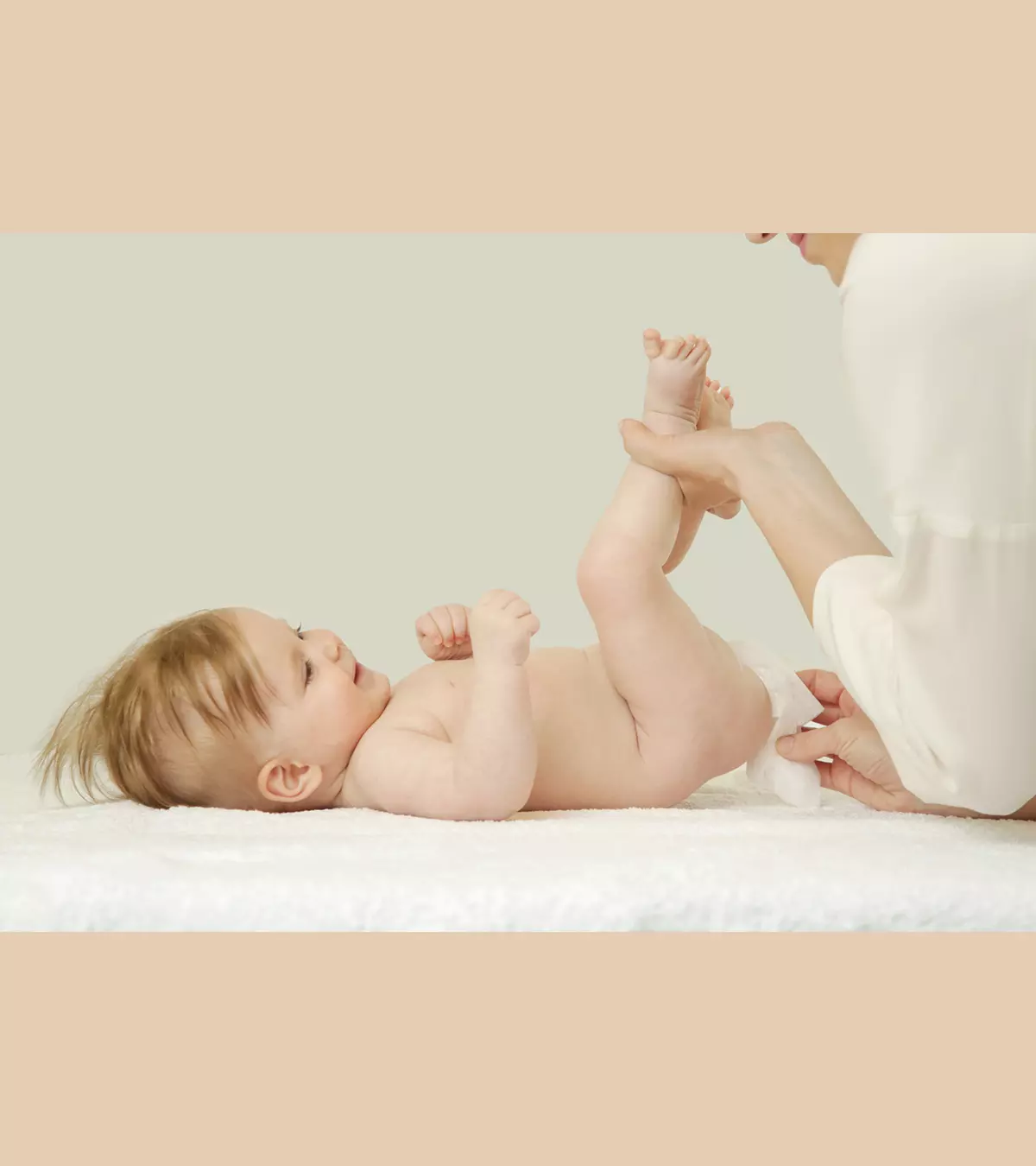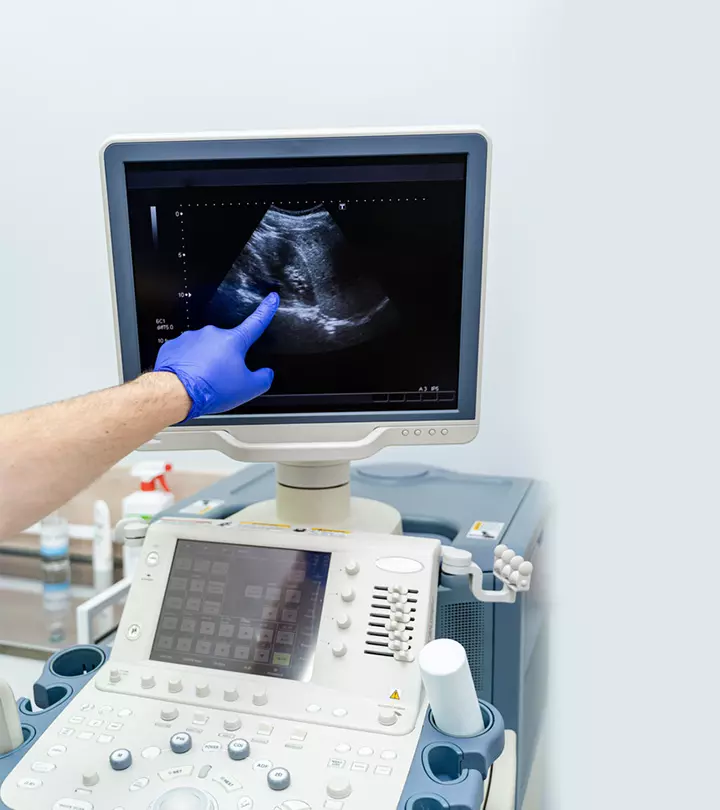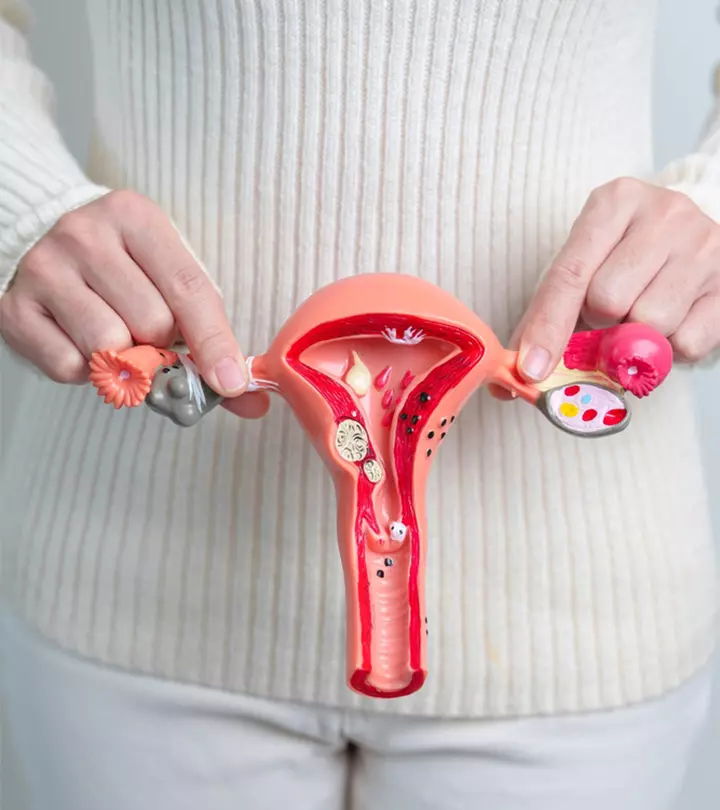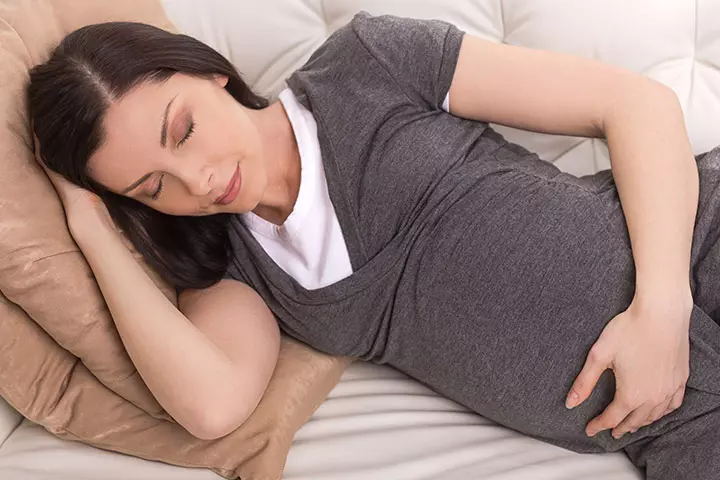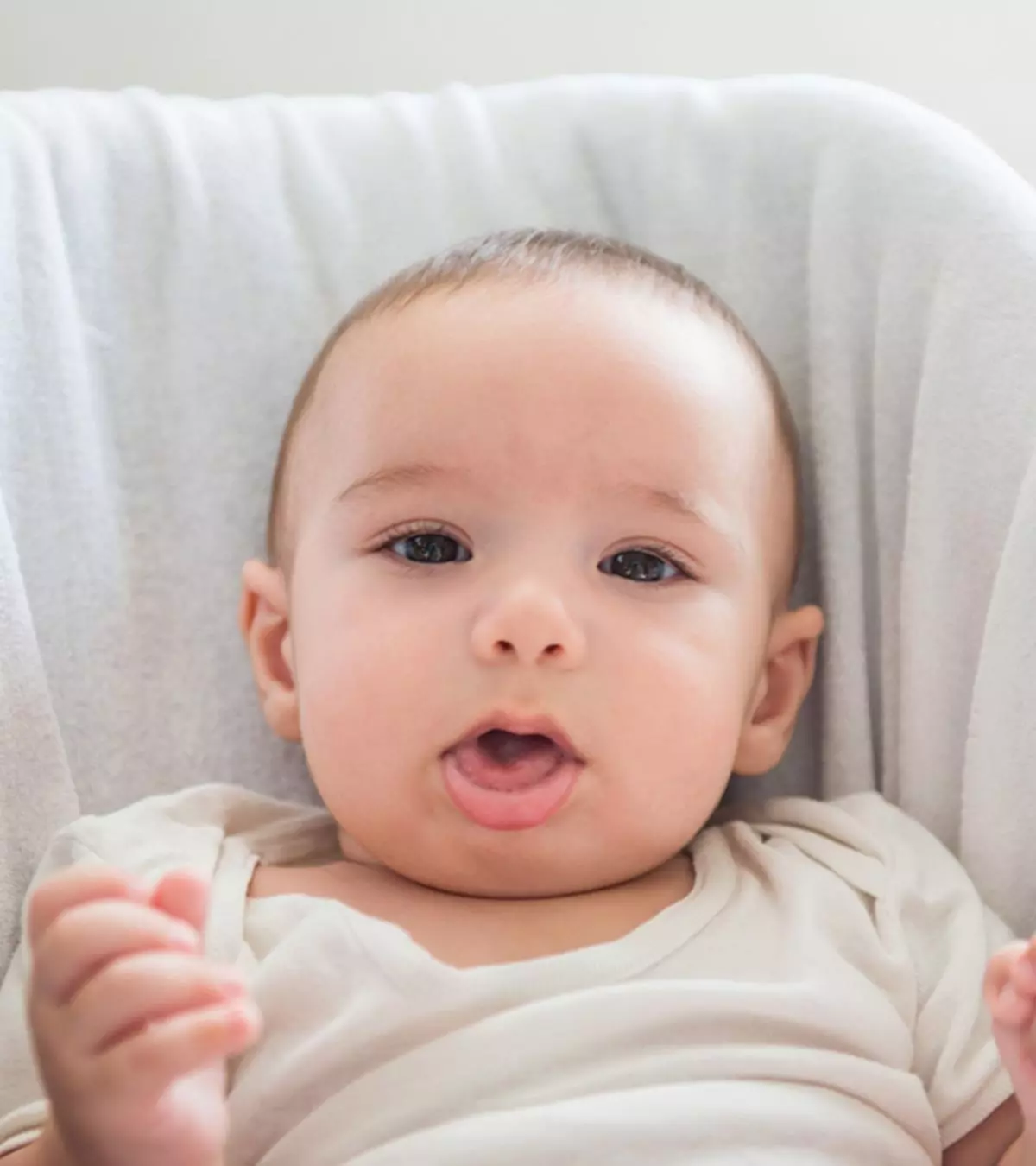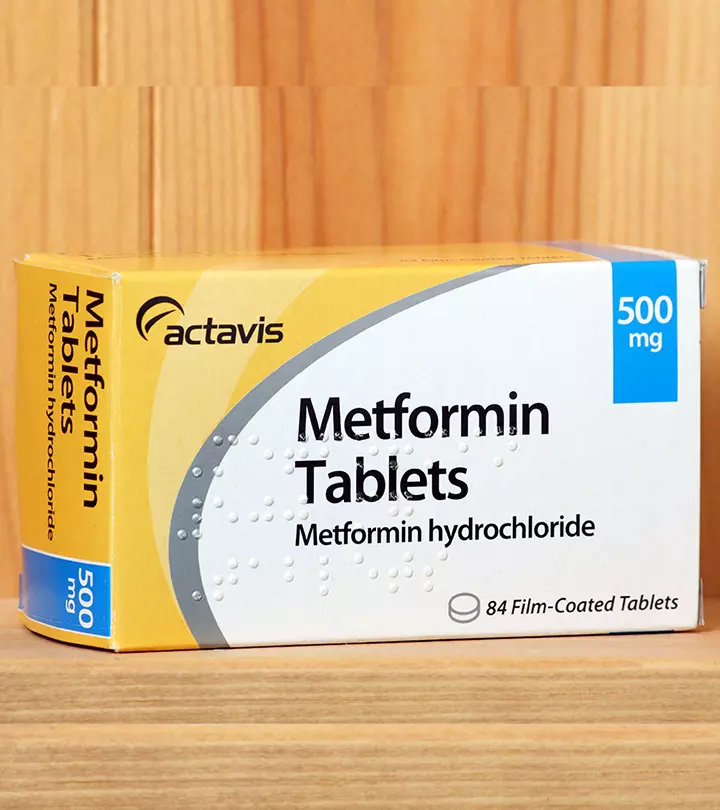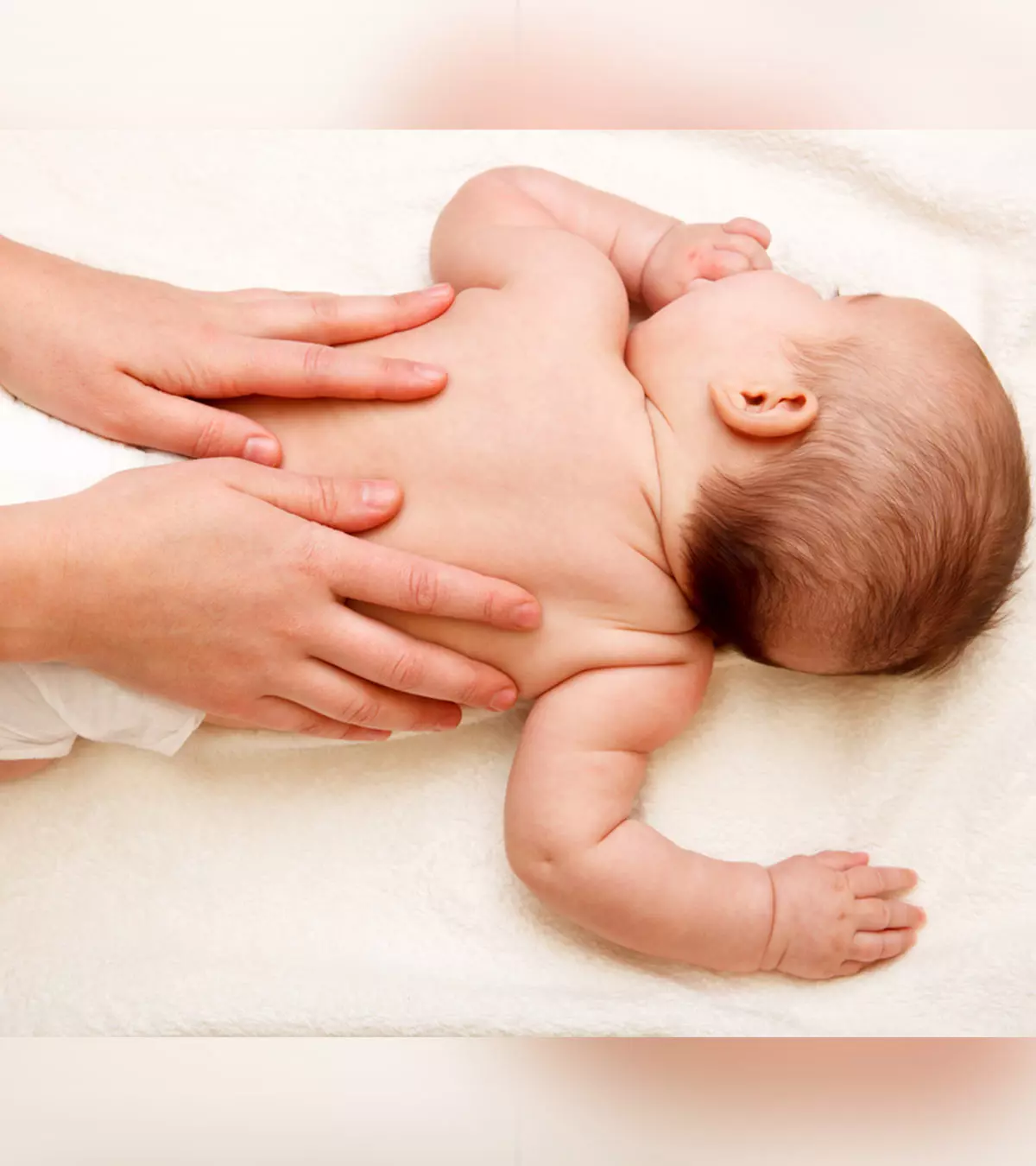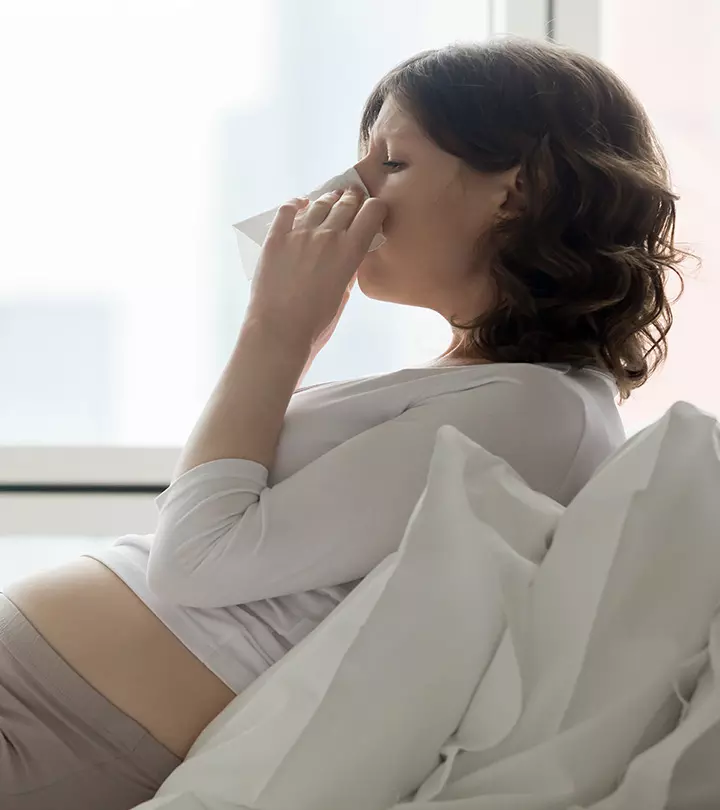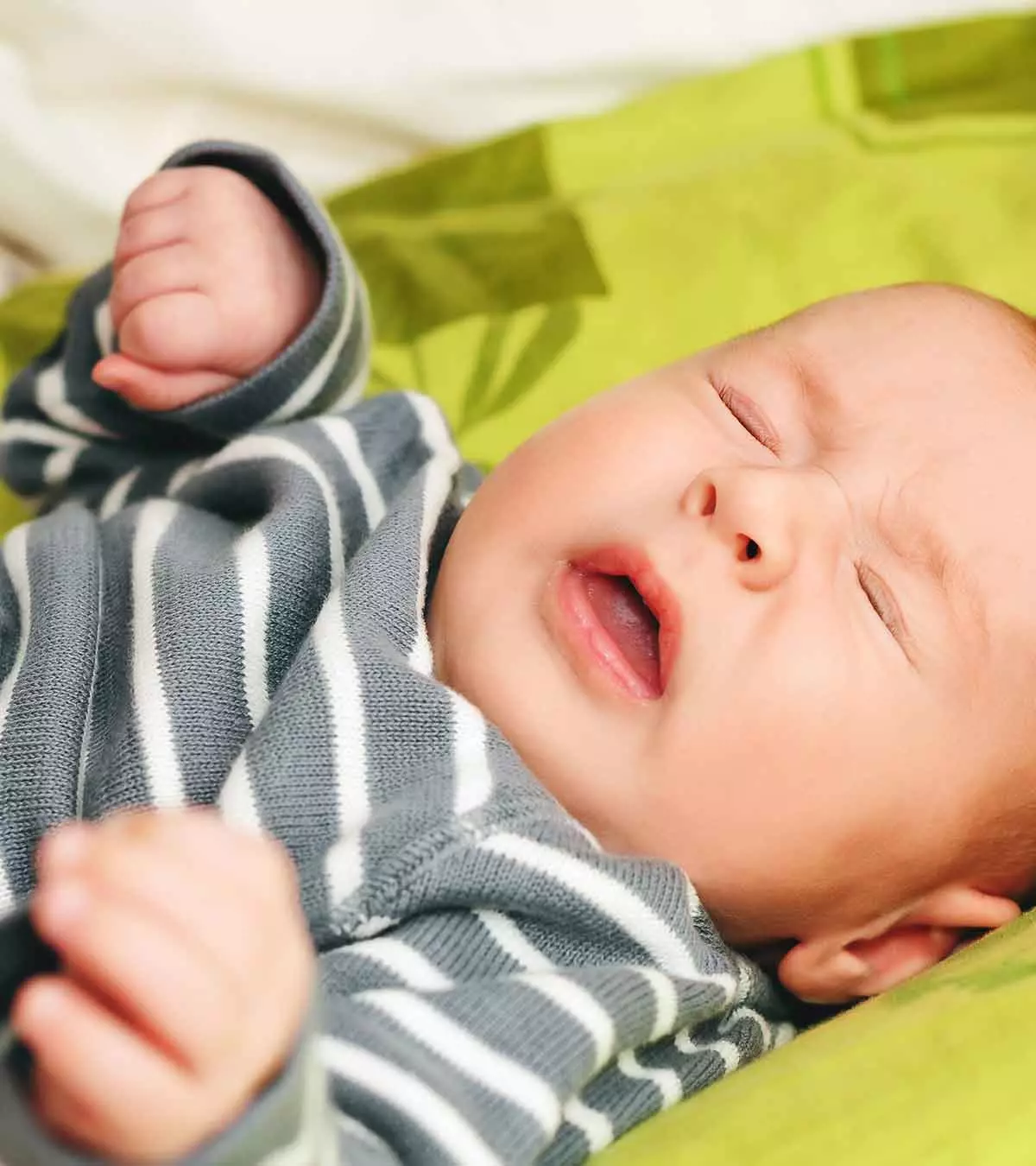
Image: ShutterStock

Newborn sneezing is a defensive mechanism that helps newborns eliminate inhaled irritants, such as dust, dirt, and germs from the airway. It is a common reflex that babies have right from the time they enter this world (1).
Generally, all babies sneeze, but some may sneeze less while others sneeze more. Yet, on average, babies sneeze more than adults due to their small nasal passages that require frequent cleaning. However, consulting a healthcare professional such as a pediatrician would be advisable if you notice additional symptoms, such as a runny nose or fever.
Read on as we tell you about the causes of sneezing in babies and when sneezing is not normal.
Key Pointers
- Newborns mostly sneeze to expel mucus or foreign bodies from their nasal passage.
- However, they may also sneeze due to short nasal passage, deviated nasal septum, dry air, etc.
- Consult a doctor if the baby experiences frequent sneezing with conditions such as fever, cold, wheezing, poor appetite, etc.
Why Do Babies Sneeze?
Sneezing is one of the body’s natural defenses against illness (2). It is basically a protective reflex provided by nature, to discard any mucus or foreign body. However, there are several other reasons why a newborn or an infant would sneeze:
- Clearing germs and irritants from the nose: Sneezing is the body’s natural reflex to clear nasal passages that have an irritant within. For a baby, anything including dust, smoke, milk that accidentally got into the nose, and even dry air can be an irritant. A sneeze helps them get rid of these irritants as well as germs.
 Quick tip
Quick tip- Expel mucus: Infants cannot blow their nose like adults do (3). Therefore, when they have nasal congestion due to mucus, they will sneeze as a natural reaction to throw out the mucus.
- Short nasal passages: Newborns are obligate nose breathers, which means they primarily depend on their nose for breathing and do not prefer breathing from the mouth (4). However, the nasal passages of the baby are tiny, and even the smallest obstruction in it can affect breathing. For instance, a baby may sneeze even when their nose presses against the chest of the mother while breastfeeding.
- Dry air: Cold weather, which at times gets excessively dry, and the overuse of indoor air conditioning, could rapidly dry nasal moisture. This is acutely bothersome for babies and leads to sneezing and a runny discharge.
- Regurgitated milk: For a few days after birth, babies regurgitate milk. This backflow of milk leads to irritation of the nasal lining. This, at times, could lead to swelling in the nasal passage, which makes those stuffy and the little one sneeze..

Image: Shutterstock
- Deviated nasal septum: A significant number of babies are born with nasal septum deviation (5). Nasal septum deviation is a condition in which the thin wall between the nasal passage is displaced to one side. This leads to narrowing of one side of the passage and impacting the breathing (grunting sound during breathing), which in turn causes a stuffy nose.
A newborn baby is most likely to sneeze due to the above reasons. However, if they are sneezing too frequently, you may check for signs that may not seem normal and warrant treatment.
 Quick tip
Quick tipWhat Sneezing May Not Be Normal?
Frequent sneezing, when accompanied by one or more of these conditions, could point to a problem that requires medical attention:
- Fever: A body temperature of above 100.4°F (38°C) is considered a fever in infants (6). If the baby has a fever along with sneezing, then it might be due to an infection of the respiratory tract.
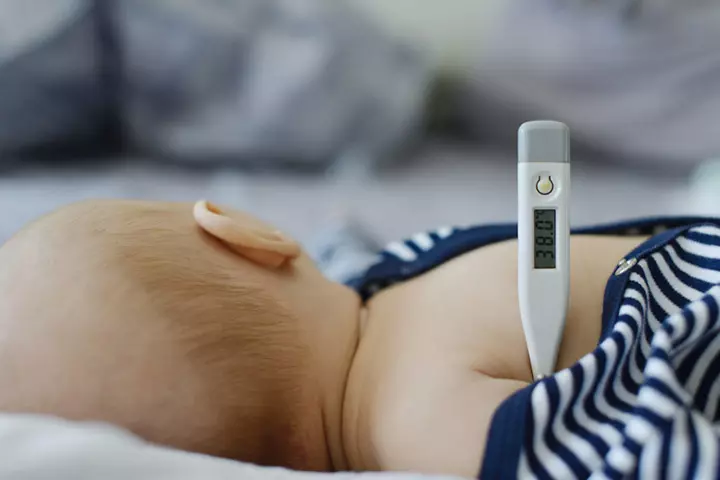
Image: Shutterstock
- Cold: The symptoms of cold include a runny nose, coughing, lethargy, and sometimes fever. A common cold is known to cause sneezing too (7).
- Coughing and wheezing: If you notice signs of baby wheezing, coughing, or sneezing, then they may have an allergy, and possibly inhaled a potential allergen, such as pollen, dust or even perfume smell (8). This causes the body to react with sneezing and other symptoms of an allergy.
- Fussiness, lethargy, and poor appetite: If the baby is fussy, colicky, lethargic, and shows little interest in eating, then it could indicate some illness generally of the respiratory tract.
- Sneezing with yellowish-colored discharge means infection from a virus or bacteria.
- Rapid bursts of sneezing: Maternal usage of narcotics during pregnancy can result in neonatal abstinence syndrome (NAS) – a type of drug withdrawal condition (9). According to the Healthcare Cost and Utilization Project (HCUP) reports released by the Centers for Disease Control and Prevention (CDC), about six newborns were diagnosed with NAS for every 1000 newborn hospital stays. One of the symptoms of the syndrome is sneezing in bursts of three to four in fixed intervals (10). For example, the baby will sneeze three to four times more rapidly in every half hour or an hour.
See a pediatrician if the baby displays any of these symptoms along with sneezing. If the baby’s sneezes are continuous and frequent, take them to a doctor, who can diagnose the cause behind the sneezing. Saline drops can clear the nasal passages.
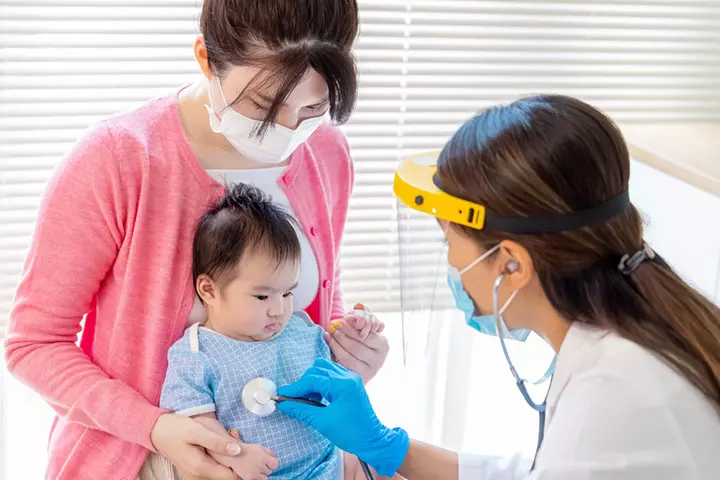
Image: Shutterstock
Frequently Asked Questions
1. Is newborn sneezing a common illness?
Sneezing does not always indicate illnesses in newborns. They may sneeze to clear the fluid left on their airways after birth. In most cases, this fluid goes out of the system during birth. Sneezing can be a way to clear dust or other particles from the nose and airways. It can be less likely a sign of infections such as cold or flu (11).
2. Why do newborns have stuffy noses?
Frequent stuffy noses in newborns can be caused by irritants such as perfumes, cigarette smoke, and dry air. Cold and other respiratory infections can also cause a stuffy nose. Weaker immune systems and developing airways could make them more susceptible to respiratory conditions (12).
3. How much is too much sneezing for a newborn?
While occasional sneezing is common in babies, excessive sneezing could indicate an underlying problem. If you are concerned about your baby’s sneezing frequency, see a doctor (2).
4. How long does newborn sneezing typically last?
Typical cold symptoms, including sneezing in babies, usually last for a few days to a few weeks. It is often normal unless accompanied by other more severe symptoms such as fever and breathing difficulties (13).
5. Are there any home remedies for newborn sneezing?
You may use a humidifier to add moisture to the air and keep the baby’s surroundings clean. However, seek medical advice to learn specific treatment measures for your baby (14).
6. Can newborns catch colds from adults and start sneezing?
Young infants and babies are susceptible to catching colds from adults as their immune systems are still developing; hence, keeping your infant away from other children and family members who have cold symptoms is recommended. Common cold symptoms in infants include sneezing, runny nose, and coughing (13).
7. Can breastfeeding help prevent newborn sneezing?
Breastfeeding may provide newborns with antibodies and vital nutrients that might boost their immune system, lowering the risk of respiratory infections that may cause sneezing (15).
8. What over-the-counter medicines can I give my newborn for sneezing and congestion?
Over-the-counter cold medications are generally not recommended for babies and young infants. Although saline nasal drops or sprays can help relieve nasal congestion, always check with a doctor before administering any medication to a baby (14).
Newborn sneezing is a natural defensive method to eliminate any irritants in the airway. Hence, if your baby sneezed a few times, do not panic since it might be a reflex to eliminate any potential allergens. However, consult your medical professional for prompt medical care if the sneezing is accompanied by other symptoms such as a runny nose, wheezing, or cough in babies. Further, note any signs of infections such as yellow discharge or fever. Maintain hygiene and try to eliminate any potential allergens around the house. Simultaneously, use hypoallergenic products to prevent the sneezing reflex.
Infographic: What Makes A Baby Sneeze?
Every movement and development in your newborn may excite and worry you. So if you notice your baby sneezing, you may be curious about the cause. The infographic below explains the potential causes of newborn sneezing, from common to severe. Also, consult your child’s pediatrician promptly if sneezing is recurring. Illustration: Momjunction Design Team
Some thing wrong with illustration image shortcode. please verify shortcode syntax
References
1. Newborn Reflexes and Behavior; Seattle Children’s Hospital (2019)
2. Stuffy Nose, Sneezing, and Hiccups in Newborns; University of California
3. Whooping Cough Can Kill; University of Utah
4. M.J. Miller et al., Oral breathing in newborn infants; National Center for Biotechnology Information (1985)
5. Anil S. Harugop et al.; Prevalence of Nasal Septal Deviation in New-borns and Its Precipitating Factors: A Cross-Sectional Study; National Center for Biotechnology Information (2011)
6. Signs and Symptoms of Fever; American Academy of Pediatrics
7. Kuender D. Yang et al.; Prevalence of infant sneezing without colds and prediction of childhood allergy diseases in a prospective cohort study; National Center for Biotechnology Information (2018)
8. Ilknur Haberal Can et al.; Sneezing and Runny Nose: Should Allergy Testing Be Routinely Performed?; National Center for Biotechnology Information (2011)
9. Neonatal Abstinence Syndrome; Health Encyclopedia, University of Rochester Medical Center
10. Withdrawal Scoring Sheet; Stanford Medicine
11. Here Is Why Newborn Sneeze So Much; Infacol
12. Nasal congestion: How to clear your baby’s dry, stuffy nose; KidsHealth13. Coughs and Colds: Medicines or Home Remedies; Paediatrics and child health
14. Coughs and Colds: Medicines or Home Remedies?;
15. Influenza (Flu) and Breastfeeding; Centers for Disease Control and Prevention
Community Experiences
Join the conversation and become a part of our nurturing community! Share your stories, experiences, and insights to connect with fellow parents.
Read full bio of Dr. Mubina Agboatwalla
Read full bio of Rohit Garoo
Read full bio of Dr. Ritika Shah
Read full bio of Anindita Ghatak






